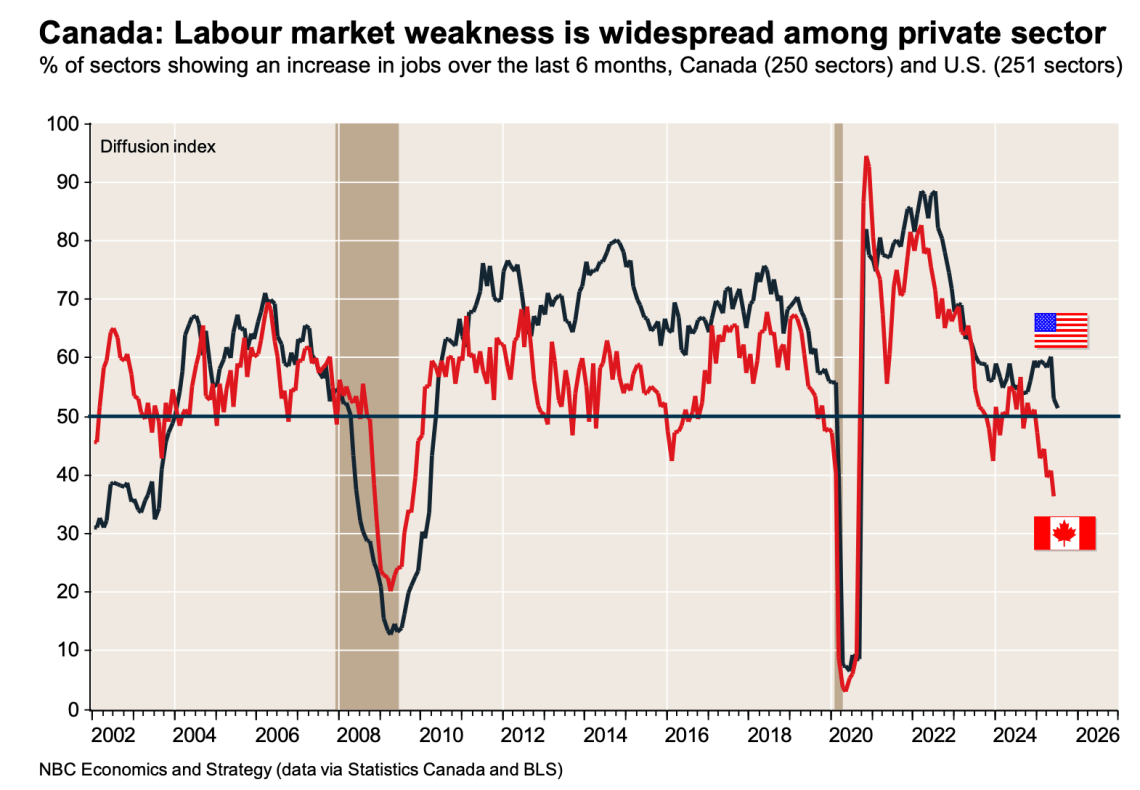The Canadian economy was cruising smoothly until this year, but its landing is now looking choppy. National Bank of Canada (NBF) economists are warning investors that the economy slipped into excess supply in Q2. The Big Six bank sees this problem continuing into Q3 with job creation drying up, GDP contracting, and investment fleeing into other opportunities.
Canadian Job Losses Broad Across The Private Sector
Canadian payroll data reveals that job losses are broad, concentrated in the private sector, and alarming. The Survey of Employment, Payrolls, and Hours (SEPH) shows 32.9k jobs were lost in June, falling to just 0.2% annual growth. Losses were observed in 18 of 20 sectors, signaling weak demand—not just a shift in the type of employment.
The bank warns that private sector weakness is particularly concerning in 2025. Over the past six months, just 36% of 250 private sector industries recorded job growth. “… the lowest proportion since pandemic, thus highlighting the current weakness in the Canadian labour market,” notes Daren King, an economist with NBF.
Source: NBF.
Canada’s Economy Is Contracting, In “Excess Supply”
The job losses, while concerning, aren’t a surprise with the latest GDP data. The economy’s annualized growth showed a 1.6% contraction in Q2, nearly twice the expected pace. June GDP saw a downward revision from 0.1% growth to a 0.1% contraction. The advanced estimate for July (+0.1%) reveals tepid growth is expected to continue into the next official report.
“Overall, this week’s data does not change our view that the Canadian economy, already in excess supply, has experienced difficulties in the second quarter and will in the third,” he explains.
The bank sees the labour market’s erosion continuing to impact the third quarter.
Canadian Investment Confidence Eroding, Capital Flight Soars
A quick recovery is likely wishful thinking as the trade and investment data are sending long-term warning signals. The quarterly drop in exports (-26.8%) was much larger than the decline in imports (-5.1%) in Q2, further eroding the balance of trade. The export decline is amplified by foreign firms stockpiling inventories in prior quarters to get ahead of tariffs; this is still a massive drop.
“…trade made its largest negative contribution ever, with the exception of the temporary distortion caused by the pandemic. Tariff uncertainty has also shaken business confidence, prompting firms to significantly reduce their investments,” warns King.
He urges a trade deal sooner rather than later to help mitigate any further damage. However, the scale of damage will already have a long-term impact on any recovery. The bank didn’t get into it, but last week we noted that Canada is seeing record capital flight. This is a strong sign that investors, both domestic and foreign, see fewer opportunities available in Canada than abroad. It’s not easy to reverse investor sentiment on near term growth, as it’s more of a “show us it’s done” issue.
You Might Also Like


